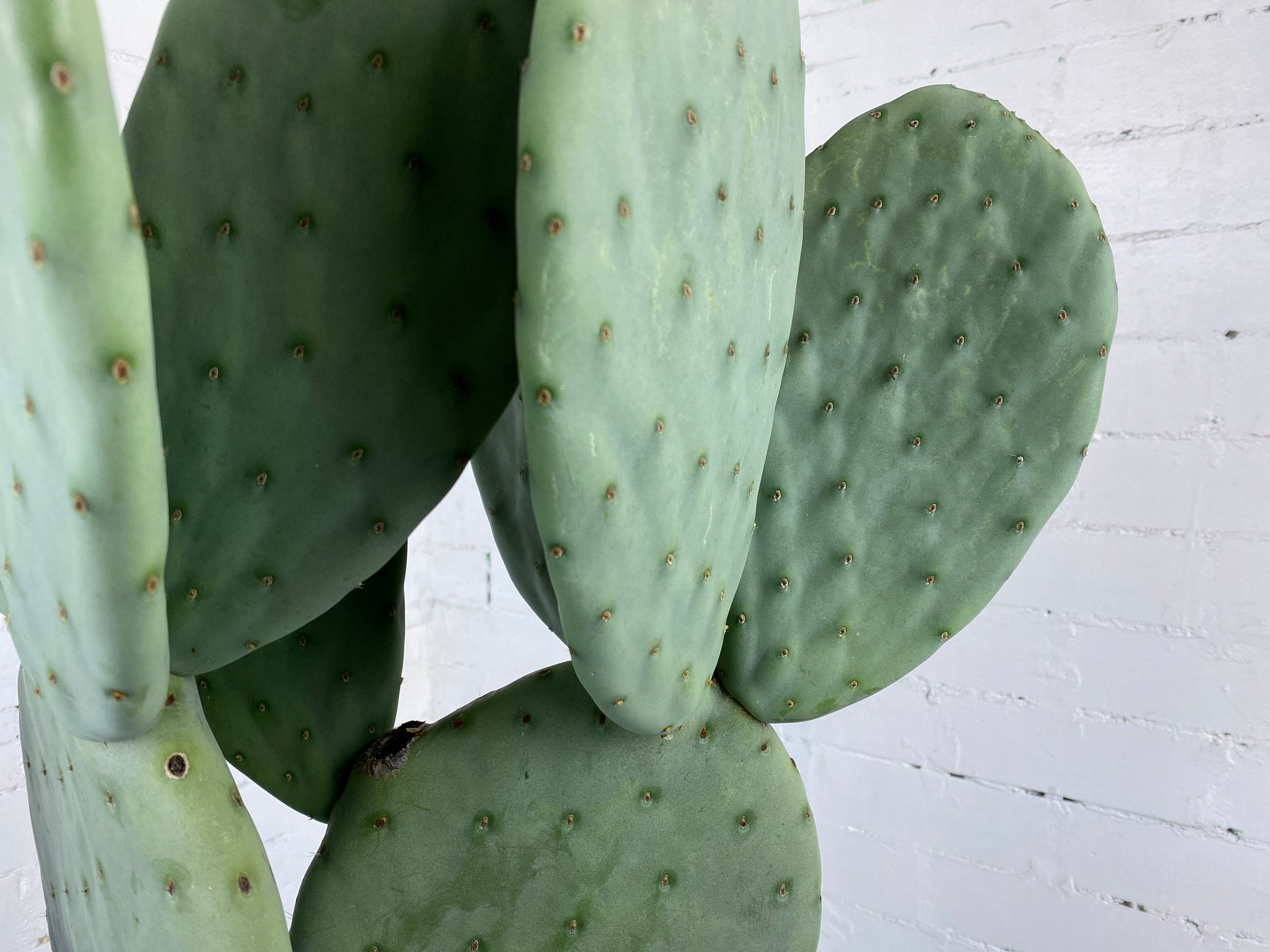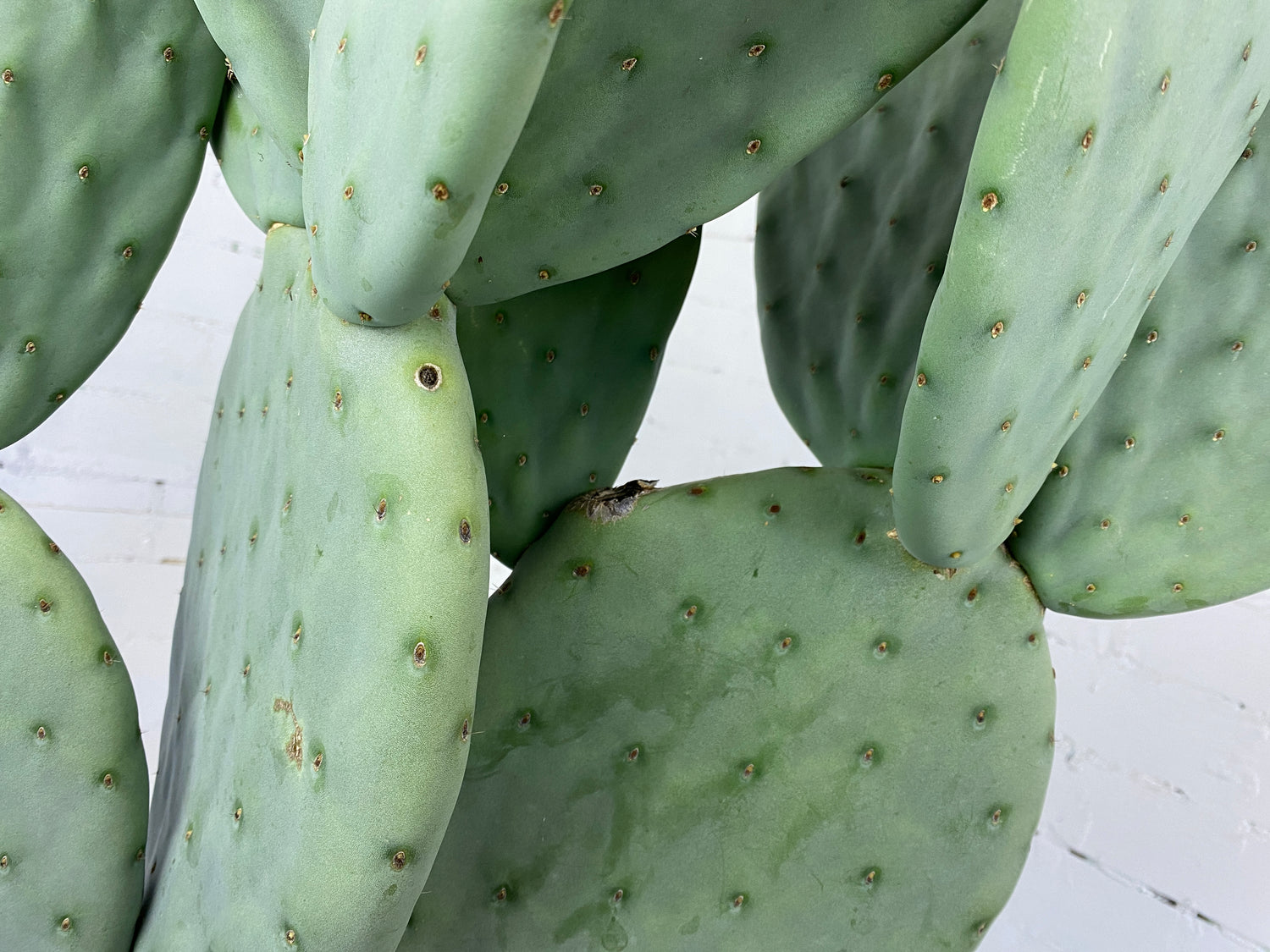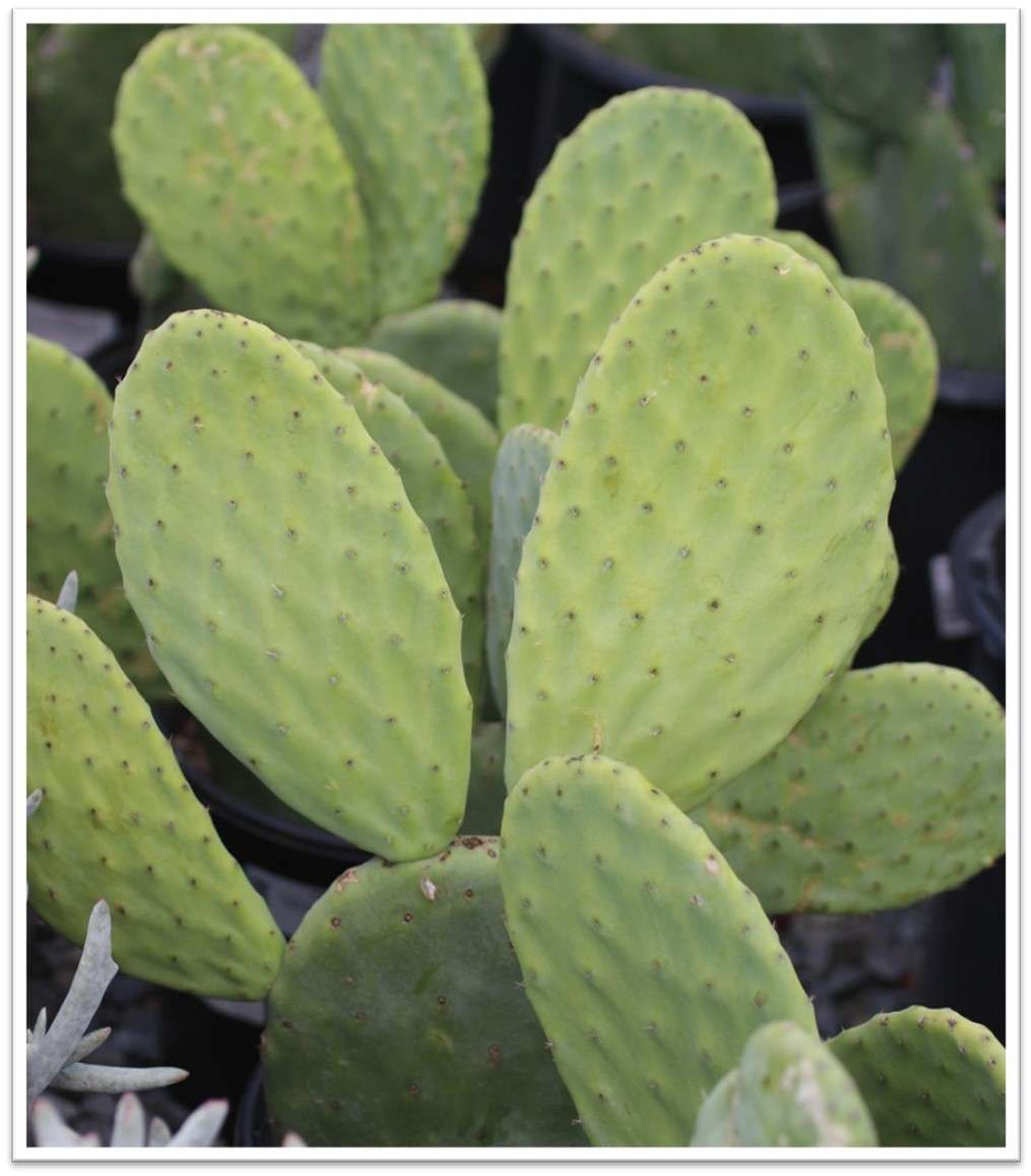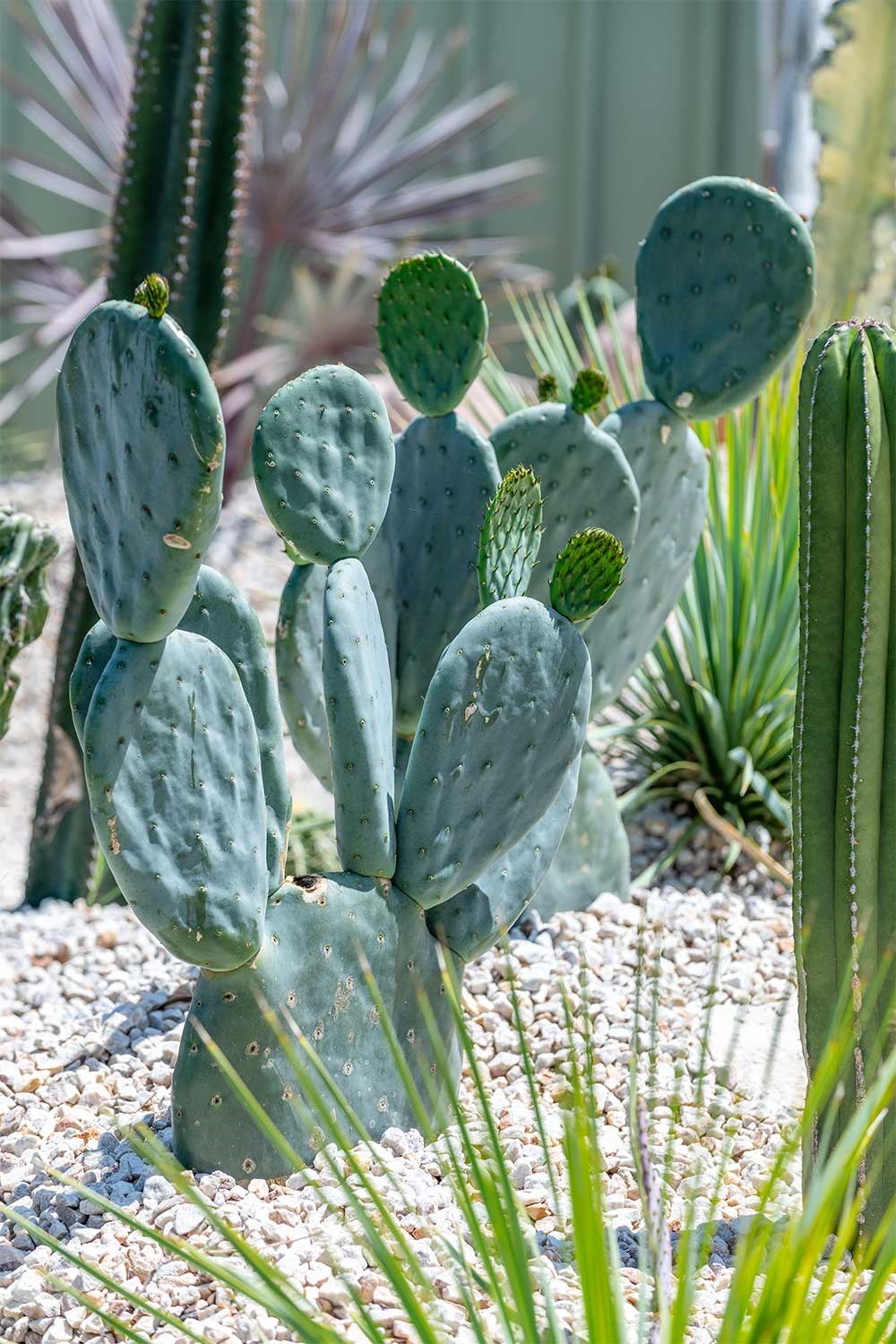
Opuntia Burbank Spineless Mickey Mouse Cactus The Plant Co.
Commonly called Spineless Prickly Pear Cactus, flat cactus and thornless cactus, Opuntia species have distinct branching pad-like stems dotted with glochids (barbed bristles) and sharp spines. The fruit borne looks like a pear, only speckled with prickles hence the name.

Opuntia “Burbank Spineless” Cactus garden, Cactus, Prickly pear cactus
The Opuntia Burbank Spineless is a variety of Prickly Pear created by hybridiser Luther Burbank in the early 1900s by cross-pollinating the Mexican Prickly Pear (Opuntia Tuna) and the Indian Fig (Opuntia Ficus-Indica). This Californian hybrid is highly valued for its lack of spines and high nutritional value. It can be

PlantFiles Pictures Opuntia, Burbank's Spineless Prickly Pear 'Burbank Spineless' (Opuntia
By Teo Spengler last updated July 23, 2021 If you are among the many gardeners who like cactus but don't like spines, it may be time to consider installing Ellisiana cactus in your backyard. Its scientific name is Opuntia cacanapa 'Ellisiana' but it is better known as spineless prickly pear. What is a spineless prickly pear?

Opuntia Burbank Spineless Mickey Mouse Cactus The Plant Co.
These were developed mostly from hybrids of varieties of the Indian fig ( Opuntia ficus-indica) and the Mexican prickly pear ( Opuntia tuna ), and were offered in two main types: the fruiting varieties, grown for their variously colored and flavored prickly pears, and the forage varieties, grown for their edible pads (properly called thalli), wh.

Opuntia Burbank Spineless Mickey Mouse Cactus The Plant Co.
Opuntia Burbank Spineless. Opuntia ficus-indica x tuna - Spineless Prickly Pear. Out of Stock. Only %1 left. Let me know when this item is back in stock . Notify me. Item code: 181328P. Opuntia is a large, branching, shrubbing cactus with round, flat, paddle-shaped leaves, and prominent, bulbous fruits that look amazing teamed with a.

Burbank Spineless Opuntia — Bondi Jungle Exotic Nursery
This variety of Opuntia is a favourite of ours due to it being near spineless, drought tolerant and the instant impact it brings to any garden. It's best to position your Opuntia 'Burbank Spineless' in well-drained soil. If you're potting it up ensure you use a pot with drainage holes and use a good quality cactus specific potting mix.

Opuntia Burbank Spineless
Botanical Name: Opuntia ficus-indica 'Burbank Spineless' Botanical Name: Opuntia ficus-indica 'Burbank Spineless' Common Name: Barbary Fig, Fig Opuntia. A true cactus that spreads to form a shrubby fence. Blue-green cladodes are flat, rounded and pad-like. Widely spaced areoles lack spines. Large flowers are followed by sweet, prickly-pear fruits.

Opuntia ficusindica 'Burbank Spineless' Devil Mountain Wholesale Nursery
Start indoors. Can handle transplanting. Other info: Seeds may be extremely slow to germinate. Propagation: Other methods: Cuttings: Stem. Layering. Other: Individual pads form new plants; they must dry and callous for 10 days before planting. Containers: Needs excellent drainage in pots.

Opuntia Burbank Spineless Mickey Mouse Cactus The Plant Co.
BURBANK SPINELESS. Cactaceae family Hybridized in central CA from Mexican seed. D eveloped in the early 1900s as fodder for cattle by Luther Burbank (1849-1926), famed horticulturist, in central California, this hybrid of Opuntia ficus-indica can be found in cultivation worldwide. Luther Burbank produced more than 800 plant varieties and.

Opuntia ficus indica Burbank Spineless Wholesale Nursery Nurseries in Melbourne, Sydney
300mm Size chart Add to Cart Opuntia Burbank Spinesless is a much less spikier version of the common prickly pear cactus. They are a light green blue colour and just ooze cool. They are best suited to a beautiful feature pot in full sun where they can grow unencumbered by other plants.

Opuntia Burbank Spineless Mickey Mouse Cactus The Plant Co.
Opuntia "Burbank Spineless" is a classic edible nopales cultivated by Luther Burbank in Santa Rosa. You can tour the house! Can grow 10 to 12 feet tall. Edible fruit. Characteristics: Temperature: Hardy to 20F Full Sun to Part Sun Ultra Soil Blend Low Water Shop Now, Local Delivery: 2 to 5 gallon Other Images:

Opuntia ficusindica "Burbank Spineless" Cactus Jungle
Opuntia ficus-indica 'Burbank's Spineless' needs 0.8 cups of water every 12 days when it doesn't get direct sunlight and is potted in a 5.0" pot. Use our water calculator to personalize watering recommendations to your environment or download Greg for more advanced recommendations for all of your plants. Water 0.8 cups every 12 days

Opuntia burbank Spineless Prickly Pear Plant Culture
The Opuntia ficus indica 'Burbank Spineless' is a prickly pear cactus that has long been a domesticated crop plant important in agricultural economies throughout arid and semiarid parts of the world. It is a large/bushy or sometimes erect and tree-like perennial cactus.

7 plants perfect for a Palm Springs garden Better Homes and Gardens
Opuntia are prone to predation from a number of pests. Spider mites are effectively managed with a contact insecticide or other natural controls. Aphids can simply be sprayed off with a hose or managed with the same controls.

Opuntia ficus indica Burbank Spineless Wholesale Nursery Nurseries in Melbourne, Sydney
The Opuntia Burbank Spineless is a variety of Prickly Pear created by hybridiser Luther Burbank in the early 1900s by cross-pollinating the Mexican Prickly Pear (Opuntia Tuna) and the Indian Fig (Opuntia Ficus-Indica). This Californian hybrid is highly valued for its lack of spines and high nutritional value.

Opuntia ficus indica Burbank Spineless Wholesale Nursery Nurseries in Melbourne, Sydney
Opuntia ficus-indica 'Burbank's Spineless': An evergreen shrub, cactus / succulent or fruit / vegetable with green foliage and orange and yellow flowers in summer followed by red fruit. Attractive to bees. To grow well, it prefers sun - mostly sun and occasional - low water. Drought tolerant once established. Prefers to be dry in winter.